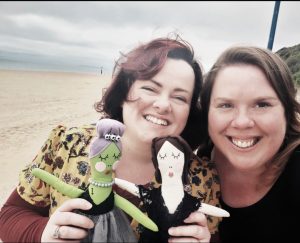Dr Melanie Stockton-Brown and Amy Tatum, Doctoral Researcher, in the FMC have created a short-film and zine to share their research on Mary Shelley’s Frankenstein, copyright, voice, and attribution for women authors. As Mary Shelley is buried in Bournemouth and the Shelley family lived here and have many links to the area, it is wonderful to be able to celebrate the extensive feminist, copyright, and cultural legacy of such an influential author and person.

Melanie and Amy with the leading ladies.
Beloved is a short-film retelling Mary Shelley’s Frankenstein, and celebrating her feminist, literary and copyright legacy. This is a queer feminist retelling using puppets, and emphasises how important it is to be acknowledged as the creator and copyright owner of your creative works. Look out for the beautiful seaside shots of Bournemouth beach and cliffs!
FrankenZine: Voice, Copyright, and Women Authors is a zine is about women authors, and the importance of the proper legal and cultural recognition of their voices, and their right to be acknowledged as the author of their creative works. These are four women authors who have fought to keep their copyright, to be attributed as the author, and who have experienced gender and racial discrimination in having their voices heard equally. Our voices and stories are very important, and so is having our name spoken and remembered with those stories.
The short-film and zine were kindly funded by CIPPM, and the Department of Humanities and Law QR funding.












 New CMWH paper on maternity care
New CMWH paper on maternity care From Sustainable Research to Sustainable Research Lives: Reflections from the SPROUT Network Event
From Sustainable Research to Sustainable Research Lives: Reflections from the SPROUT Network Event REF Code of Practice consultation is open!
REF Code of Practice consultation is open! ECR Funding Open Call: Research Culture & Community Grant – Apply now
ECR Funding Open Call: Research Culture & Community Grant – Apply now ECR Funding Open Call: Research Culture & Community Grant – Application Deadline Friday 12 December
ECR Funding Open Call: Research Culture & Community Grant – Application Deadline Friday 12 December MSCA Postdoctoral Fellowships 2025 Call
MSCA Postdoctoral Fellowships 2025 Call ERC Advanced Grant 2025 Webinar
ERC Advanced Grant 2025 Webinar Update on UKRO services
Update on UKRO services European research project exploring use of ‘virtual twins’ to better manage metabolic associated fatty liver disease
European research project exploring use of ‘virtual twins’ to better manage metabolic associated fatty liver disease